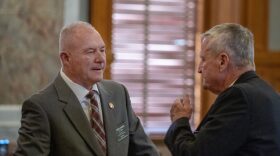LAWRENCE, Kansas — While Kansas inches toward a 2022 vote that could reel back abortion rights, U.S. Rep. Sharice Davids wants to enshrine access to the procedure in federal law so that states like her own can’t ban it.
Her backing of the bill — along with the majority of Democrats in the U.S. House — comes on the heels of the U.S. Supreme Court declining to block a Texas law banning abortions after six weeks into a pregnancy, before most women know they’re pregnant. The vote will come days after the Supreme Court announced it will hear a direct challenge in December to the landmark Roe v. Wade case that gave Americans abortion rights.
“Having the legislative safeguard to protect access to the full range of health care,” Davids said. It’s important … no matter what state you live in, that includes Kansas.”
The lone Democrat representing Kansas in Congress is among more than 200 Democrats co-sponsoring the Women’s Health Protection Act. The bill, which the U.S. House is set to vote on this week, would enshrine abortion protections at the federal level and overturn many of the stringent restrictions that states have already passed. That would likely include some laws in Kansas like state-required counseling before a procedure and a ban on telemedicine abortions.
With 212 co-sponsors, the bill would only need six more backers to pass the U.S. House. Senate passage looks far less likely.
While the push for federal abortion rights legislation is perennial on Capitol Hill, the stakes run higher in anticipation that the increasingly conservative high court could overturn Roe v. Wade. That would open the way for individual states to effectively shut down abortions — particularly if the justices grant states the power to restrict abortions even when the fetus is unable to live outside the womb.
More anti-abortion legislation has been passed by state legislatures in 2021 than in any other year.
“It’s no longer, ‘Oh, this could happen or, we’re telling these really extreme stories so that people will rally around abortion, right?’” said Alesha Doan a professor of women, gender and sexuality studies and public affairs at the University of Kansas.
“It is, ‘Well, this is what is happening in Texas,’” she said, “It’s very easy to see it happening in states that are already extremely hostile to reproductive rights, and Kansas ranks up there at the top.”
None of the three Republicans representing Kansas in the U.S. House are listed as co-sponsors. U.S. Reps. Jake LaTurner, Ron Estes and Tracey Mann all campaign as staunchly anti-abortion and are likely to vote against the bill.
Danielle Underwood, a spokesperson for Kansans for Life, said the state shouldn’t be deprived of regulating abortion clinics.
“We think that just as restaurants have regulations on them, as gyms have regulations and medical outpatient facilities have regulations on them... this is no different,” she said.
“This is not an industry,” Underwood said, “that should just be unlimited in its operations and in its business practices.”
In Kansas, more of the attention is being directed to the Legislature and an amendment that would change the state constitution to say there’s no right to an abortion. It’s slated for the August 2022 primary.
Republicans in the Legislature could further restrict abortion access in Kansas if the amendment is passed. But in the wake of the six-week ban in Texas, leading anti-abortion voices, including Republican leaders in the Legislature and the powerful anti-abortion rights group Kansans for Life, have said all their energy is focused on the constitutional amendment to protect abortion restrictions already in Kansas law.
“Every common-sense policy — including the ability to regulate the cleanliness and safety of clinics — is at risk” if the amendment fails, said House Speaker Ron Ryckman.
Michelle Schroeder, chief of policy and communications for state Senate President Ty Masterson, accused abortion rights advocates of making Kansas a “tourist attraction” for abortion and advertising to women from Texas, who currently face the tightest abortion restrictions in the country.
The message from Kansas abortion advocates to women in Texas, “clearly demonstrates the need for common-sense regulations,” Schroeder said. But, passing the constitutional amendment, she said, “That is our priority."
Doan said there’s a reason to attempt a ban later, contrary to what lawmakers in states like Missouri have done.
“A six-week abortion ban erases a lot of that agenda,” Doan said. “Because that makes it moot if that ban is in place.”
Four other states — Alabama, Louisiana, Tennessee and West Virginia — have rewritten their state constitutions to specify there’s no right to an abortion. Tennessee and Louisiana have since passed six-week abortion bans and Alabama passed a near-total abortion ban. But all of those state actions have been blocked by the courts.
Kansas lawmakers introduced a bill that would ban abortions at six weeks in 2013, but the bill died in a House committee.
Abigail Censky is the political reporter for the Kansas News Service. You can follow her on Twitter @AbigailCensky or email her at abigailcensky (at) kcur (dot) org.
The Kansas News Service is a collaboration of KCUR, Kansas Public Radio, KMUW and High Plains Public Radio focused on health, the social determinants of health and their connection to public policy.
Kansas News Service stories and photos may be republished by news media at no cost with proper attribution and a link to ksnewsservice.org.
Copyright 2021 KCUR 89.3. To see more, visit KCUR 89.3. 9(MDA4OTAxNzAzMDEzMjc0MTc2MzA5ZDZlMw004))







